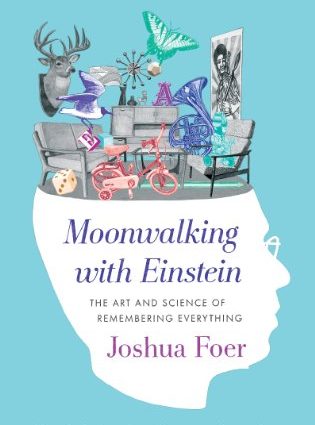Moonwalking with Einstein by Joshua Foer – book review

Jim Kwik’s book “Limitless” gave me a lot of energy and motivation to work on my mental abilities. One of many books referenced there is “Moonwalking with Einstein”, which was labeled as groundbreaking. If you are the one who thinks human memory of a healthy human* can’t be improved, you definitely need to read the book.
*There are brain damages that destroy long therm memory, thus making memory improvement impossible.
Joshua Foer’s interest in memory training started with an unrelated visit at a Weightlifting Hall of Fame, where he watched a photo of a strongest man in the world. He questioned himself if there is also a title for the smartest person of the world. A good portion of googling did not provide him with an unequivocal answer. He stumbled on a name of Ben Pridmore – the world memory champion at that time. In one of his interviews, he revealed that anyone could train their memory and achieve similar results as he.
In 2005 Josh went to the US memory championships to write an article about not so popular at the time competition. His true motivation, though, was led by curiosity of how do the contestants perform such tricks. The participants of these championships called themselves mental athletes. It amazed Josh how these apparently ordinary people had the ability to remember so many things in seconds. He tried to talk to some of them to find out what special talents they possess. To his confusion, they all stated that there is no special power needed to memorize a deck of cards.
Journey to the depths of the memory
Josh followed the participants to know them better and with time they become friends. He kept thinking about the fact that anyone can do a memory training and he decided to train for the 2006 championships. One of the memory grand masters from England, Ed Cook becomes his mentor.
Research led him to the Human Performance Lab, where Anders Ericsson and researchers are examining the top performers to find out what makes some people experts. Josh knew that if he wanted to place high during championships, he needed to become an expert within one year. Ericsson agreed to provide him with his feedback in exchange for the granular data from his everyday practice. This win-win solution provided Josh with constant progress analysis and support on how to improve. Ericsson received the possibility to track the process of building expertise from a novice to an expert.
The main story line covers author’s preparation for the Memory Championships, however the author has a brilliant way to plot his research results into the story. Starting from Simonides, who is the first person we know of, inventing memory techniques. Josh guides us through development of mnemonics and reveals how and why these techniques were used during the history of a mankind.
The number one takeaway from the book is that we can achieve the goals we set if we undertake a deliberate effort. What the Experts and top performers are doing we can replicate to achieve expertise. By harnessing focus, planning and constant feedback we can quickly find when our development reaches a plateau. This could be overcome by increasing difficulty or stepping out of comfort zone.
It might be comforting that years of practice are not equivalent to expertise. One can perform action for several years and still suck at it. Only a deliberate effort to improve can bring progress.
Memory training has not provided Josh with superpowers. Even after the comptetion he frogets things that he not focused on remembering. He still forgets where he put his keys. Despite this fact he learned to value memory as a necessary ingredient of creativity but also personality.
